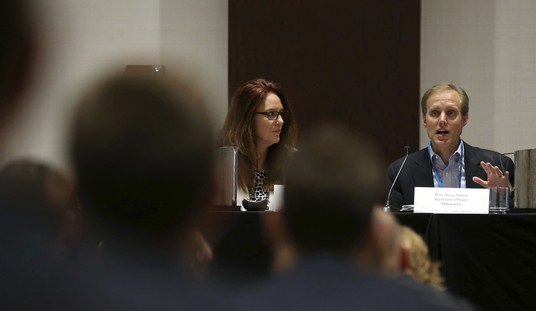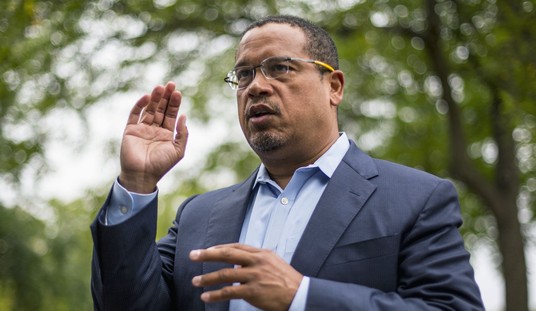Did the sacked diplomatic mission in Libya fail to meet basic security standards set by the State Department and US law? Well, it’s not like the American consulate in Benghazi had any special security needs from its location in eastern Libya, where terrorist networks have mingled into militias, and where US intelligence had a vital need. Oh, wait ….
The U.S. diplomatic post in Benghazi, Libya, was operating under a lower security standard than a typical consulate when it was attacked this month, according to State Department officials.
The mission was a rented villa and considered a temporary facility by the agency, which allowed a waiver that permitted fewer guards and security measures than a standard embassy or consulate, according to the officials.
There was talk about constructing a permanent facility, which would require a building that met U.S. security and legal standards, the officials said.
Allowing a waiver would have been a decision made with input from Washington, Libyan officials and the ambassador, according to diplomatic security experts.
“Someone made the decision that the mission in Benghazi was so critical that they waived the standard security requirements, which presents unique challenges to the diplomatic security service as you can imagine,” said Fred Burton, vice president for Intelligence at STRATFOR, an intelligence analysis group.
The next question should be who approved the waiver. After all, as noted above, this is perhaps one of themost challenging spots for an American diplomatic mission. The collapse of the central government allowed the radical Islamist terror networks that had operated for years under cover to come out into the open. They didn’t have any gratitude for American intervention against Moammar Qaddafi, which is why the CIA needed to have a diplomatic installation in order to keep tabs on those suddenly-emboldened terrorists. That should have prompted better-than-minimal security at the very least, not less-than-minimal security for an American consulate.
Oh, and that protest-spun-out-of-control story? Forget it:
The American, who spoke to CNN on Monday on the condition his name not be used, said he had been speaking with Stevens less than three hours before the deadly attack.
He said there was no indication during the conversation that anything was wrong, saying Stevens sounded upbeat and calm and he was very enthusiastic about the next day’s meeting with the American.
About 20 minutes after that conversation, the American spoke with a U.S. security officer to discuss logistics about the upcoming meeting. That call also revealed no signs of any pending trouble, he said.
The American had a second call with the security officer a little more than an hour later, around 9:30 p.m. local time, and the situation had dramatically changed. The security officer told the American “we’ve got a real problem here” and hung up.
The timing matches what CNN’s Arwa Damon, who has been reporting from Benghazi, said about the September 11 attack. Damon reported a group of armed individuals showed up outside the consulate around 9:30 and a firefight broke out within 30 minutes.
CNN has done more reporting on this incident than most other media outlets, much to the chagrin of the State Department. State attacked CNN for their use of a journal left in the rubble that belonged to Ambassador J. Christopher Stevens, claiming that CNN promised the family that it wouldn’t be used at all, a claim CNN disputes. Other journalists have also slammed CNN for its use of the journal, but as I argue in my column for The Week, this is what used to be known as reporting — something that seems to have disappeared at other media outlets after the Obama administration’s story fell apart:
Two days after State clammed up, the Obama administration sent U.N. Ambassador Susan Rice to five different Sunday talk shows to push the official line at the time on the Benghazi attack, which is that it was a spontaneous protest that “spun out of control” and resulted in a violent riot. At that time and since, the Libyan government forcefully rejected that conclusion, insisting that the attack had been premeditated and conducted by one or more terrorist networks operating in eastern Libya. By week’s end, the White House was forced to change its story, admitting that it had been a terrorist attack. Hillary Clinton and Barack Obama both insisted that they would find those responsible for the murder of Stevens and three other Americans, more than a week after the anniversary of 9/11 when the terrorist attack occurred.
One might think that those same Sunday talk shows would want to revisit Ambassador Rice’s categorical denials from a week earlier — but one would be sorely disappointed. Only CNN’s State of the Union show included any guests with a foreign-policy portfolio, House Intelligence Committee chair Mike Rogers (R-Mich.) and Senator Lindsey Graham (R-S.C.), a member of the Armed Services and Homeland Security committees. Fox News’ Chris Wallace grilled Obama adviser Robert Gibbs on Libya and foreign policy. The rest of the talk shows featured nothing but horse-race analysis and commentators on domestic policy. Amazingly, less than two weeks after a successful terrorist attack that claimed the life of an American ambassador, a week after another ambassador claimed that it was just a spontaneous protest gone bad, and less than a week after the U.S. government had to reverse its initial stance on whether it was a terrorist attack at all, only CNN and Fox News thought to cover foreign policy on their Sunday schedules.
So what happens when a reporter does ask the State Department to discuss the Benghazi attack and the collapse of their narrative? BuzzFeed’s Michael Hastings found out the hard way in an e-mail exchange with Hillary Clinton’s spokesman Philippe Reines (bad language ahead):
On Sunday morning, BuzzFeed correspondent Michael Hastings emailed Philippe Reines, Hillary Clinton’s longtime aide and personal spokesman at the State Department, asking a series of pointed questions about State’s handling of the Benghazi fiasco, and Reines’ over-the-top attack on CNN. The emails quickly got personal, with Reines calling Hastings an “unmitigated asshole” before an exchange of harsh words on both sides.
The email chain concluded with Reines writing that Hastings should “Fuck Off” and “Have a good life.”
To be fair, Hastings became hostile and somewhat unprofessional after a curt response from Reines, so there’s enough blame to go around on this exchange. Still, we expect government officials to respond professionally, and we expect the State Department to offer a little more transparency on a major incident (and terrorist attack) than a transparently false cover story followed by stonewalling, especially when four Americans are dead at least arguably in part due to the security decisions made by State for Benghazi. At least CNN (and BuzzFeed) seem interested in that story.








Join the conversation as a VIP Member